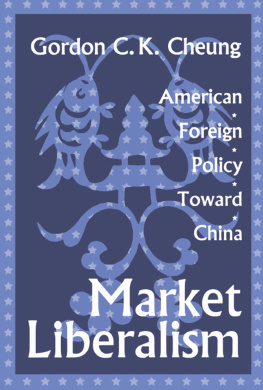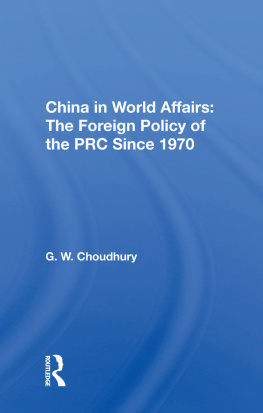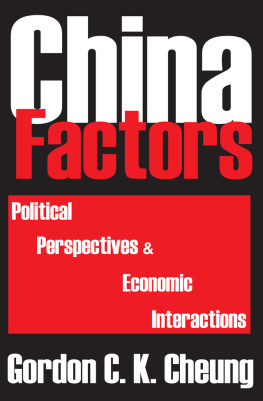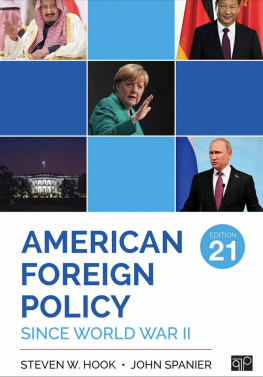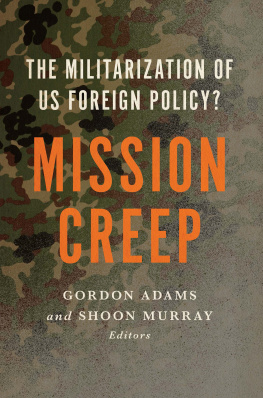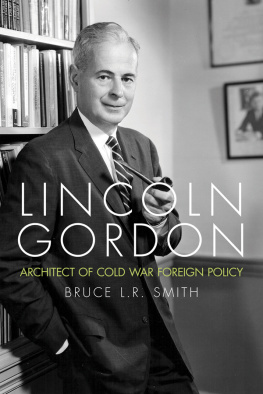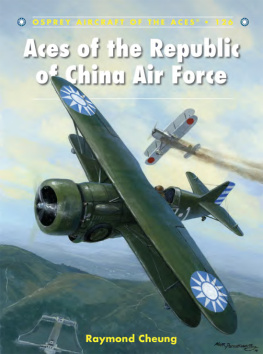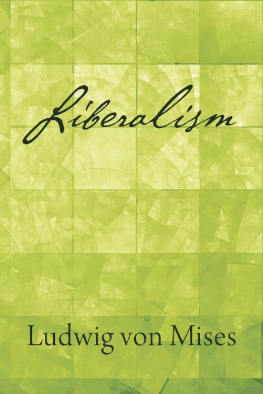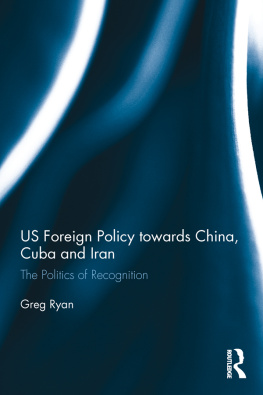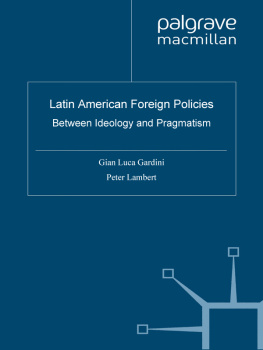Market Liberalism
Gordon C. K. Cheung
Market Liberalism
American Foreign Policy Toward China
First published 1998 by Transaction Publishers
Published 2017 by Routledge
2 Park Square, Milton Park, Abingdon, Oxon OX14 4RN
711 Third Avenue, New York, NY 10017, USA
Routledge is an imprint of the Taylor & Francis Group, an informa business
Copyright 1998 by Taylor & Francis
All rights reserved. No part of this book may be reprinted or reproduced or utilised in any form or by any electronic, mechanical, or other means, now known or hereafter invented, including photocopying and recording, or in any information storage or retrieval system, without permission in writing from the publishers.
Notice:
Product or corporate names may be trademarks or registered trademarks, and are used only for identification and explanation without intent to infringe.
Library of Congress Catalog Number: 98-18320
Library of Congress Cataloging-in-Publication Data
Cheung, Gordon C. K.
Market liberalism : American foreign policy toward China / Gordon C.K. Cheung
p. cm.
Includes bibliographical references and index.
ISBN 1-56000-378-2 (alk. paper)
1. United StatesForeign economic relationsChina. 2. China Foreign economic relationsUnited States. 3. United States Economic policy. 4. United StatesForeign relationsChina. 5. ChinaForeign relationsUnited States. I. Title.
HF1455.Z4C49 1998
337.73051dc21
98-18320
CIP
ISBN 13: 978-1-56000-378-6 (hbk)
Contents
U.S.-China relations are a controversial topic by definition. The countries not only represent two of the largest powers in the world but also stand for two different ideologies in world politics. During the cold war, their relations witnessed the change from containment policy to a strategic triangle, and from normalization to rapprochement. There was ongoing military confrontation between the United States and China, first the Korean War and then the Vietnam War. Yet in terms of foreign relations, these terms and analyses, focusing mainly on military and confrontational angles, explain only part of their relations. An important ingredientmarket forcedeserves much attention if one wants to have a more balanced view of their relations, either during the cold war or the post-cold war period. This is the major objective of this book, to interpret U.S.-China relations by dissecting the facilitation of the market force.
I wish to extend my thanks to Professor C.Y. Chang, who patiently guided me from the pursuit of knowledge to intellectual enrichment. His comments, ideas, and encouragement are invaluable to this study. Professor Wu Guoguang gave useful criticism of my writing, and I am grateful for his concern throughout the writing process. I wish to thank Professor Lee Chin Chuen and Professor John Wong for their time and comments. Susan Blumberg Liu, Barbara Koh, and Dimitri Kaczmarek were enormously helpful in polishing my writing. Many thanks to Irving Louis Horowitz for the publication of my work. The comments made by the anonymous reviewer were particularly useful in refining the argument and shaping the presentation of the thesis in a more readable style. I thank Claudia Kirschhoch for her professional editing.
The University Services Center at the Chinese University of Hong Kong provided sufficient resources on the China materials. Solomon Wong at the United States Information Service in the American Consulate General generously provided updated information about contemporary U.S. politics. In terms of locating firsthand material and the sources for the American side, I benefited from the Eu Tong Sen scholarship, which enabled me to study and conduct research at the University of Hawaii in the latter half of 1995. The East-West Center afforded constant help during my stay in Hawaii. Throughout the research and my academic pursuit, I faithfully extend my gratitude to the Department of Government and Public Administration of the Chinese University of Hong Kong for giving me this opportunity and for their spiritual and financial support as well. I would like to thank the following professors and area specialists who have given me support and insight during different stages of the writing process: Eric Harwit, Hsin Chi Kuan, Reginald Kwok, Oliver Lee, Peter N.S. Lee, Kuang Sheng Liao, Shu Yun Ma, Milan T.W. Sun, King Kwun Tsao, Byron S.J. Weng, and Kui Hung Wong. An early version of .
Finally, I would like to express my deepest thanks to my wife Flora. Her encouragement and support eased various difficulties during the writing process.
Gordon C.K. Cheung
Americans have associated commerce with open markets, open markets with political freedom, political freedom with democracy, and democracy with peace.1
Jeffrey E. Garten
Reinterpretation of Sino-American Relations
This book attempts to reinterpret U.S. foreign policy toward China after World War II by looking at the extemalization of market forces.2 Throughout the book, I shall put forward the concept of Augmented Market Liberalism (AML) as a theoretical guide to analyze their relations.
AML is defined as a process of assimilation and transformation of a country generated by the extemalization effects of the market force. In terms of Sino-American relations, the extemalization effects refer to the U.S. construction of a favorable environment to accomplish such change. First, from the foreign policy perspective, the transformation of Japan after 1945 strongly situated the market ingredients and the model of capitalism in the Far East.
The opening up of U.S. domestic markets to Japan and the nurturing of the Japanese market economy gave rise to multiple effects in terms of economic development and marketization toward Asian countries. Second, the success story of the Four Little Dragons further enhanced ideas of using market forces as a linchpin of development. In cold war terminology, these two examples served as the classic cases of the manifestation of containment policy. In the post-cold war era, the denoting effects of U.S. foreign policy are still profound. U.S. interests include: (1) military stability and peace in the Far East; (2) guaranteed economic opportunities in the Far East that cannot be toppled by an abrupt change in the balanceeither by the rise of a dominant China or by the internationalization of Japanof the political environment; and (3) upholding the idea of democracy through economic development in many Asian countries that are adopting a market economy as their development model.
As the major ingredient of U.S. foreign policy toward China, the pattern of market behavior gave rise to opportunity, enlargement of goals, growth through production and consumption, and the manifest orientation that envisioned change. The market is a dynamic organ which does not belong to any single country. Yet, it exists within and around countries that contained the ingredients of market forces.
Historically, the transformation effects of the market on a society has long been an academic focal point. Karl Polanyis groundbreaking book The Great Transformation initiated a classic literature studying the anatomy, the pattern of change and the facilitation of change of the market economy in the nineteenth century.3 The self-regulating nature of market behavior actually energized the world toward an astonishing new phase.4 In addition, as argued by Edward J. Nell, it is not that market outcomes are


